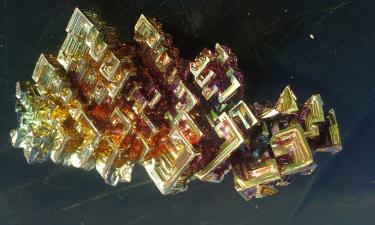Russia Focuses On Investment, Not Donations to Iraq
 The Spanish leadership has announced that it hopes to collect as much money as possible during the Donor Conference, which opens in Madrid on October 23, to restore the Iraqi economy. But whatever the level of funding the delegates decide to give Iraq, it will be insufficient. Russia intends to take part in the conference, but it will provide no donations to Iraq.
The Spanish leadership has announced that it hopes to collect as much money as possible during the Donor Conference, which opens in Madrid on October 23, to restore the Iraqi economy. But whatever the level of funding the delegates decide to give Iraq, it will be insufficient. Russia intends to take part in the conference, but it will provide no donations to Iraq.
A World Bank report prepared for the conference says that about $56 billion will be required for the reconstruction of Iraq in the 2004-2007 period. The Bank's experts and their UN colleagues have evaluated the work to be carried out in 14 sectors of the Iraqi economy. In their view, the restoration of those sectors will require $35.589 billion. Russian experts have doubts about some figures in the report and intend to specify the details during the Madrid conference.
However, the World Bank report does not include expenditures on security in Iraq, on the oil industry's restoration and on cultural, sports, youth and religious programmes. They were evaluated by members of the Coalition Provisional Authority led by Paul Bremer. According to their recommendations, $19.440 billion should be allocated for these purposes.
A point to note here is that the coalition authorities managed to keep within the sum of $20 billion dollars the US intends to provide for Iraq in the near future. The money is to be remitted to the Iraq Development Fund, which is controlled by the Coalition Provisional Authority, i.e. the US.
Other potential donors for Iraq, European countries in the first place, have refused to provide money for the fund, as they do not want the Americans to control how the money is spent. Accordingly, an announcement will be made in Madrid that a Fund for the development and restoration of Iraq controlled by the World Bank and the IMF will be established. Both funds will work in parallel.
The only question is whether or not enough money will be collected to cover the required spending.
It is known that Japan is intending to grant $5 billion dollars for Iraq's reconstruction, of which $1.5 billion will become available in 2004. Canada is prepared to donate $200 million, and the European Union $230 million. Other countries, in particular the Persian Gulf states, will announce the size of their donations at the Madrid Conference.
The Bush administration expects that the rest of the money will be collected in new donations in the US itself and from profits from Iraqi oil sales. However, Congress has displayed no particular interest in these donations, especially when election day is drawing closer and the country's economy is beset by problems. Moreover, there has to be serious investment in the Iraqi oil industry before any profits can be made. A number of investors are willing to put money into Iraq, but what is the sense in providing money for a pipeline to be built, for example, when it is blown up nearly every day? Furthermore,the World Bank experts did not focus on the investment issue in their report, although it is a matter for a separate discussion in Madrid.
Moscow believes that the future of Iraq depends precisely on major investment projects in the oil industry, the energy sector, irrigation, transport and agriculture.
Russian companies have more or less managed to defend their positions in the oil and gas sphere, at least in terms of contracts under the UN Oil for Food programme. As of today, three quarters of them have been recognised as priority ones and will remain in force after the programme comes to an end on November 21. Moreover, additional protocols to many of them have been signed, and the range of commodities and the extent of deliveries have been changed. This concerns, in the first place, firms operating in the energy and construction spheres.
The fate of Russian oil and gas investment projects in Iraq is yet to be determined, and is unlikely to be decided in Madrid, though Moscow is prepared to pour major financial resources into oil and gas. Deputy Foreign Minister Yuri Fedotov, who will head the Russian delegation in Madrid, said in a RIA Novosti interview that if work is resumed on Western Kurna-2, about $3 billion in investment could be attracted to develop the oilfield in the first seven years alone. Another $350 to 400 million may be invested in the development of other oilfields. Moreover, potential Russian investment is not confined to these sums, he said. Moscow hopes that all Russian contracts signed with the former Iraqi government, in particular those signed with LUKoil to develop the Kurna-2 oilfield, will be honoured.
In the opinion of Yuri Shafranik, chairman of the Council of the Union the Oil and Gas Industrialists of Russia, this country has a good basis at least to retain the projects that are already underway in Iraq and to get new contracts.
Firstly, the Russians have experience of working in the region and can find a common language with the local population. Secondly, the Russian companies involved are not ruling out the possibility of working with Western partners. Since the end of hostilities, many Russian oil and gas companies have been negotiating with their colleagues in the US, Canada and Britain on co-operating in Iraq.
Major investment projects will provide Iraq with the opportunity to implement its plans for increasing its oil output, which, in turn, will mean more money for the country's restoration. Moreover, it will give Iraqis more jobs, which will produce a positive effect on the political situation and help ease tension in the security sphere.
Accordingly, Moscow believes that aid to the Iraqi people should not necessarily be confined to donations. Indeed, the investments made by Russian companies may well be more important than the donations made by some countries.
Marianna Belenkaya, RIAN
Subscribe to Pravda.Ru Telegram channel, Facebook, RSS!




